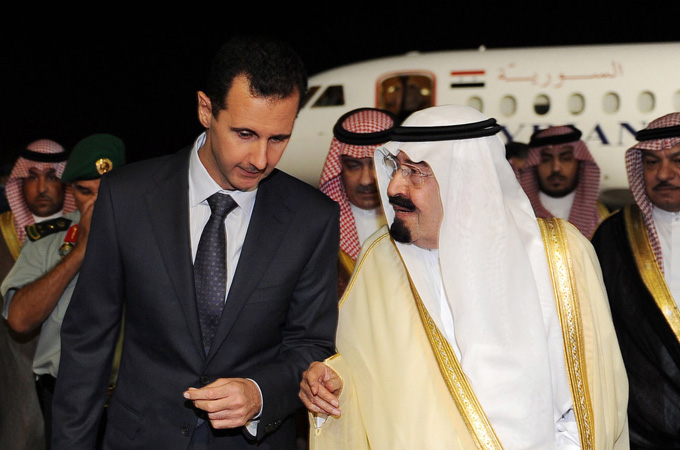Saudi-Syria seek Hariri trial calm
Regional leaders propose a deal aimed at avoiding sectarian unrest if Hezbollah members are indicted by UN-backed court.

 |
| Syrian and Saudi leaders have reportedly proposed a deal that would rule out the targeting of Hezbollah [File: EPA] |
Saudi Arabia and Syria appear to set aside traditional rivalries over Lebanon in an attempt to ease possible sectarian tensions if members of the Shia Muslim Hezbollah movement are indicted over the assassination of Rafiq al-Hariri, a former prime minister.
Fearing potential violence by Lebanon’s Sunni and Shia communities after the indictments are announced, King Abdullah of Saudi Arabia and Bashir al-Assad, Syria’s president, are pushing for a deal they hope will ensure stability.
Neither country has given details of the initiative, but a Lebanese parliamentarian told the Reuters news agency that the deal is centred around a pledge from Hezbollah not to use violence if any of its members are indicted, while Hariri would ensure that charges will not be exploited politically.
“They have reached a roadmap which concludes that it is forbidden to target the resistance [Hezbollah] internally, no matter what the indictment says,” Okab Sakr, who is close to Saad al-Hariri, the current prime minister and son of Rafiq, was quoted as saying.
“At the same time … Hezbollah does not target internal security in the name of the indictment.”
Violence feared
Lebanese politicians have warned that the Hariri tribunal risks plunging Lebanon back into civil war if it indicts members of the popular Shia Muslim Hezbollah movement over the 2005 bombing on the Beirut seafront that killed Rafiq al-Hariri and 21 others.
In May 2008, at least 80 people were killed after fighting broke out between the predominantly Hariri’s Sunni followers and Hezbollah supporters.
“There is no other choice but to make this initiative work,” Sakr said. “Nobody has an interest in [creating] problems – not Hezbollah nor Hariri. Nobody will go to the street if there is no political settlement is reached].”
Although the Saudi-Syrian initiative offers the prospect of avoiding sectarian strife, supporters of Hariri and Hezbollah are believed to differ over the timing of its possible implementation.
Hezbollah wants Saad al-Hariri to reject any indictments before they are issued, while the prime minister’s supporters say they need to see the charges first.
Hassan Nasrallah, Hezbollah’s leader, has repeatedly pressed Saad al-Hariri to repudiate the tribunal, saying it was tainted by false testimony and relied on telephone records that Israel could have manipulated.
Arrests unlikely
The draft indictments are expected to be handed over to a UN-backed tribunal later this month.
Their contents will not be made public and a pre-trial judge will take up to two months to decide whether to approve them – at which point they may or may not be published.
And if they do name Hezbollah figures, there seems to be little prospect for arrests against Hezbollah figures after Nasrallah, the group’s leader, said that “any hand that will touch any [Hezbollah member] will be cut off”.
Sakr said that it would be impossible to arrest any Hezbollah members through force given their military strength.
“It is impossible to have a war [with Hezbollah] to bring or hand someone over,” he said.
Sakr also suggested that Lebanon could cut off its share of the funding, which accounts for about half of the budget of The Hague-based tribunal.
Saudi and Syrian officials have been attempting to ease the political crisis in Lebanon’s fragile unity government since a three-way summit in July, when support for the administration was emphasised and the use of force on the streets ruled out.